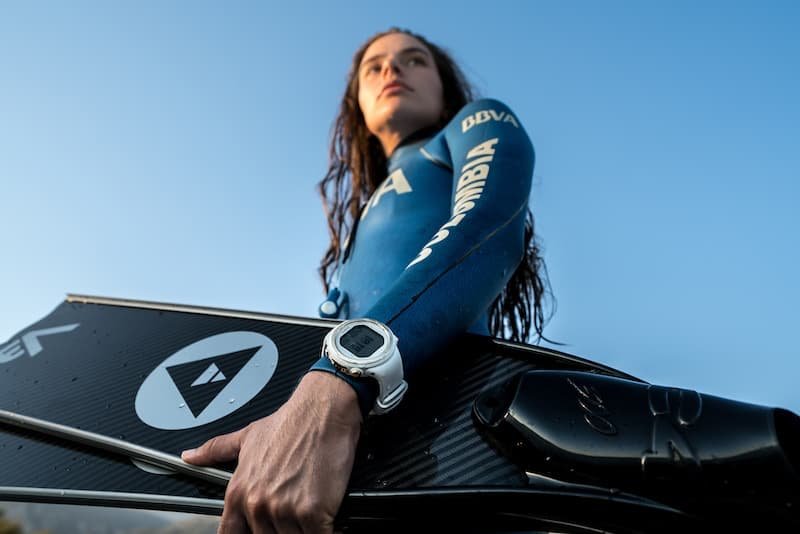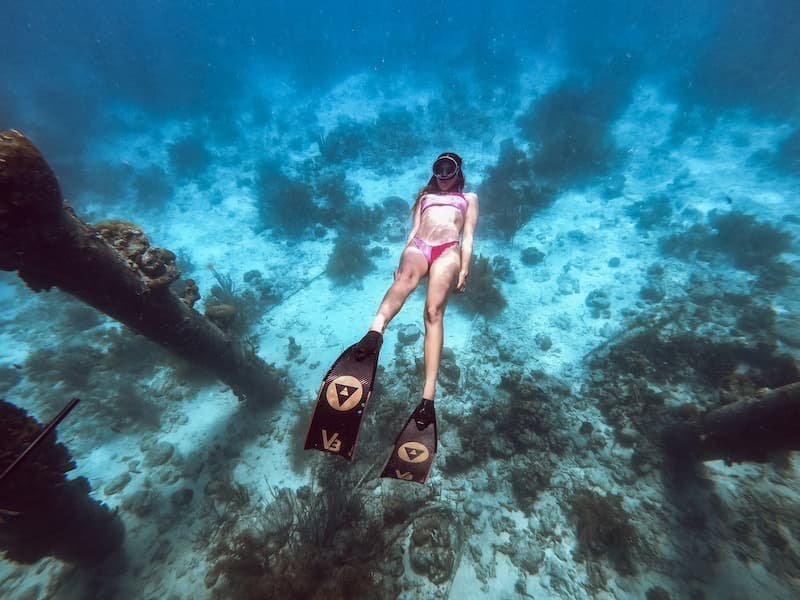
 Olivia Møller
Freediver - Activist - Explorer
Olivia Møller
Freediver - Activist - Explorer

 Olivia Møller
Freediver - Activist - Explorer
Olivia Møller
Freediver - Activist - Explorer
In the world of freediving, we are constantly exposed to an evolving spectrum of new equipment, innovative materials, and game-changing designs. Freediving gear has become not just a means of functionality, but a symbol of identity, aspiration, and for many, status. But in this pursuit of perfection and performance, one must ask a critical question: how much of it is truly necessary?
At its core, freediving is a minimalist sport. The act itself is stripped of complexity—no heavy tanks or regulators, just you and the ocean. It’s a pure, primal experience rooted in simplicity and self-reliance. However, in recent years, the landscape of freediving gear has become increasingly cluttered. From custom carbon fins to advanced wetsuits and the latest freediving computers, the market is saturated with options that promise to make you dive deeper, move faster, and feel more comfortable. The temptation to upgrade is always there.
But do you really need it all? Could embracing minimalism in your freediving gear not only lighten your physical load but also enhance your experience underwater?
Modern consumer culture thrives on innovation, novelty, and the promise of being just one purchase away from the next level. Freediving is no exception. The allure of cutting-edge carbon fiber fins or the latest freediving watch with advanced algorithms is hard to resist. Gear companies market their products with precision, tapping into both our desires and insecurities—“are you really pushing your limits without this new piece of tech?”
This growing gear obsession mirrors a broader societal trend of overconsumption in outdoor sports. What started as a niche activity driven by passion and curiosity is now influenced by the same pressures we see in mainstream sports: the constant need to optimize and upgrade. We are no longer just divers; we are consumers.
Let’s be clear: innovation is not inherently bad. High-quality equipment has made freediving safer, more accessible, and more enjoyable. However, when the pursuit of better gear overshadows the experience itself, we risk losing the essence of why we started diving in the first place.

So what is truly essential for a minimalist freediver?
A Good Pair of Fins: Fins are arguably the most critical piece of freediving gear. For many, this means carbon fins—light, responsive, and built for performance. But do you need the latest high-end model? Not necessarily. If you’re not a competitive diver pushing 80 meters, a well-made fiberglass or even plastic fin can do the job. The key is to find a pair that fits well and matches your style of diving.
A Comfortable Wetsuit: Comfort and warmth matter more than the material’s pedigree. Yamamoto neoprene might be the gold standard, but an older, well-fitting wetsuit can often outperform a shiny new one that doesn’t fit quite right. Prioritize fit over features.
A Reliable Mask & Snorkel: Forget about flashy designs or unnecessary upgrades. A low-volume mask with a good seal is all you need. Once you find a mask that works, stick with it.
A Weight Belt & Weights or a Neck Weight: This is one area where minimalism should never compromise safety. A well-balanced weight setup is essential for proper buoyancy and efficient dives.
A Freediving Computer: For beginners or those who dive casually, a dive watch may not be necessary. However, as you progress, a freediving computer becomes an invaluable tool. The key is to choose one that meets your needs without unnecessary bells and whistles.
That’s it. Everything beyond these basics is negotiable.

It’s not just physical baggage that accumulates when you overindulge in gear. There’s a psychological burden, too. Excessive focus on equipment can create a false dependency—the belief that your performance and enjoyment are directly linked to the latest upgrade.
This mindset can be limiting. You start attributing poor performance to your gear instead of examining your technique or mental state. Worse, it fosters a consumerist loop where satisfaction is fleeting, always tied to the next purchase.
Minimalism offers freedom from this cycle. When you strip your gear down to the essentials, you’re forced to focus on yourself—your body, your breath, and your connection to the water. It’s liberating.
How does one embrace minimalism in freediving gear without sacrificing performance or safety? Here are some practical steps:
Audit Your Gear: Take a hard look at your current setup. Identify what you use regularly and what sits unused in the bottom of your dive bag. Ask yourself: Does this piece of equipment serve a genuine purpose, or is it just a nice-to-have?
Prioritize Versatility: Choose gear that can serve multiple purposes. For example, a good set of fins can be used for both training and recreational diving. A wetsuit with a modular design allows you to adapt to different water temperatures without needing multiple suits.
Buy Quality, Not Quantity: Invest in durable, well-made gear that will last for years. A higher upfront cost often saves money (and resources) in the long run.
Maintain Your Equipment: Minimalism doesn’t mean neglect. Regular maintenance extends the life of your gear and reduces the need for replacements. Rinse your wetsuit and fins after each dive, store them properly, and check for wear and tear.
Embrace the Second-Hand Market: There’s no shame in buying used gear. In fact, it’s a smart move both financially and environmentally. Many divers sell high-quality equipment at a fraction of the price after upgrading.

Minimalism is not just a personal philosophy; it’s an environmental one. The outdoor industry—including freediving—contributes to environmental degradation through resource extraction, manufacturing processes, and waste. Every piece of gear has a carbon footprint.
By consuming less and extending the life of your equipment, you reduce your personal impact. It’s a small but meaningful step toward a more sustainable relationship with the ocean.
There is a quiet beauty in doing more with less. Minimalist freediving strips away distractions and reconnects you with the essence of the sport. It’s about embracing limitations and finding freedom within them. It’s about shifting the focus from what you have to what you do.
Consider the most memorable dives you’ve had. Were they defined by the gear you used or by the experience itself? The way the light filtered through the water at dawn, the sudden appearance of a curious dolphin, the feeling of complete stillness at depth—these are the moments that stay with you.
Gear can enhance these experiences, but it should never define them. The minimalist freediver understands this balance. They know that the less you carry, the more space you leave for what truly matters.